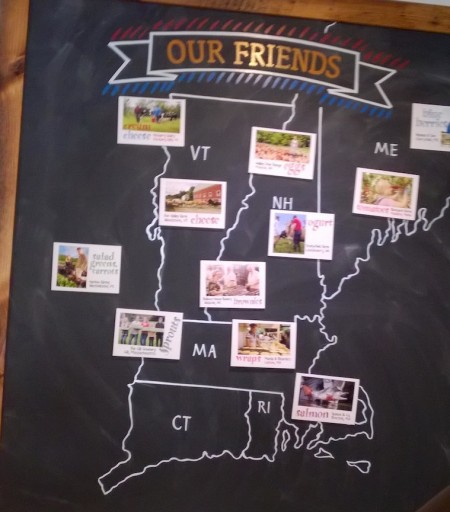
Some suppliers of The Works in Brattleboro Vermont
It is not often that I come across a restaurant that appears to place as much pride in their environmental consciousness as they do in their food and menu planning. The Works in Brattleboro, Vermont is one such place. I was not even actively looking to have lunch at a “sustainable” restaurant—I just wanted lunch. The food looked good and was a good value for what I was paying. Also, I had never thought of using goat cheese and kale in macaroni and cheese. It was really, really good!
As I was eating, I looked around and I saw a map of New England with squares on it. The map was actually a guide to where they got some of their food ingredients from. Each square was accompanied by a little blurb that told you a little bit about the supplying farm, or company. I liked the relative transparency, and their willingness to give me a better sense of where my food was coming from. Admittedly, these blurbs did not cover the entire supply chain and range of ingredients, but it was a very good start. A key part of sustainability for me is the ability to understand more about where the products I buy come from.
An extra sustainability bonus to the lunch experience was seeing a sign outlining some of the sustainability aspects of renovating the place. Some of these included reusing variety of flooring, buying local furniture when possible, reusing parts of farm equipment and an old school chalkboard etc. The sign may have been a good piece of marketing, but beyond creating a feel-good for the reader it also advertises an earth-friendly philosophy.
This particular lunch was emblematic of the type of experience I would want from any business claiming good sustainability practices. First and foremost, I am getting good value for the sales price—in this, very tasty food prepared in a reasonable amount of time. Now that I am a satisfied customer, I am very willing and even eager to appreciate the sustainability aspects of the business in question. In this case, these aspects made the lunch experience there even more memorable.